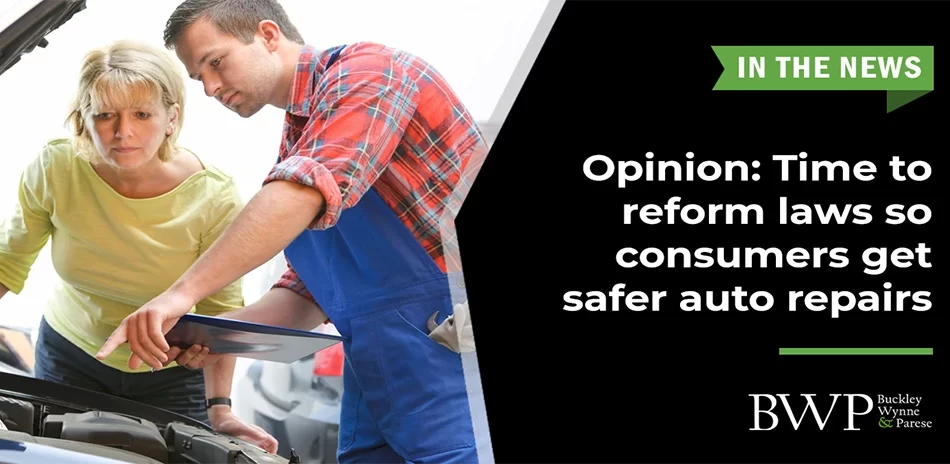Opinion: Time to reform laws so consumers get safer auto repairs
The state legislature once again considered laws that would help consumers get safer vehicle repairs.
The Auto Body Association of Connecticut, for one, endorsed needed legislative reform to protect consumers by prohibiting outside parties from pressuring licensed repairers to deviate from Original Equipment Manufacturer recommendations or installing unsafe parts.
The original vehicle manufacturer, the OEM, sets guidelines that are the undisputed standard of care for proper vehicle repair. Insurance companies have long pressured repairers to cut corners and deviate from these guidelines to effectuate cheaper repairs.
This can be done through pressures to compromise on the quality of the repair and/or mandating the use of imitation parts, which are cheaper but often do not meet the technical specification or quality standards of OEM parts. This results in improper fit and function, something that has always been important, but even more so now in the context of today’s more complex vehicles and more integrated safety systems.
Improper repairs or use of imitation, aftermarket parts may compromise the overall safety of the vehicle, compromise the vehicle’s safety systems (e.g. airbag), void the vehicle’s warranty, violate a lease or financing agreement, result in premature corrosion and/or paint problems, and cause one’s vehicle to suffer further diminished value at resale. Connecticut’s motoring public should not ever have to compromise occupant safety or needlessly accelerate the diminished value of their vehicle for no other reason than to save an insurer a few dollars. Most vehicle manufacturers have issued position statements on the importance of following recommended repair procedures and the dangers of using inferior parts, including warnings that such deviations may compromise the vehicle’s warranty.
It just makes sense.
Imagine your surgeon is preparing to operate on you. She intends to utilize a titanium plate and screws because her experience and education taught her that titanium was the best material for your repairing your injury. Just prior to the operation, however, some desk jockey from an insurance company (with no medical license, training or degree) comes in and tells your surgeon that she is only permitted to use aluminum plate and screws (because it is slightly cheaper). The insurance desk jockey rejects pleas from your surgeon that operating in this fashion would be dangerous and fall below the standard of care; and instead tells your surgeon that if she wants to use titanium, she can pay for it out of her own pocket.
If that sounds absurd, it is. But this is precisely the type of injustice that’s happening with auto body repair every day. Outside interference, primarily from insurance companies, relentlessly pressures licensed repairs to compromise quality without regard to occupant safety or repair standards.
Just as you would want your surgeon to use her best judgment when operating, you want your vehicle repairer to do the same. That means following manufacturer’s specifications. Since simple changes would save lives, make vehicles safer, and protect consumers, it is my sincere hope that this much needed reform will be passed.
Auto body repair shops have been forced to argue with insurance companies on behalf of consumers. It is time for reforms so that will no longer be necessary.
Needed reform could very well save lives, make vehicles safer, and protect consumers. Clearly, the sooner reforms are enacted, the better for us all.
Attorney John M. Parese is a partner at the New Haven-based firm of Buckley Wynne Parese. He can be reached at 203-776-2278 or [email protected].
This article was featured in the following news publications:

Serving All of Connecticut
Free Evaluation 24/7
We understand the stress of dealing with an injury. Our team is here to provide compassionate support and effective legal representation, statewide.

